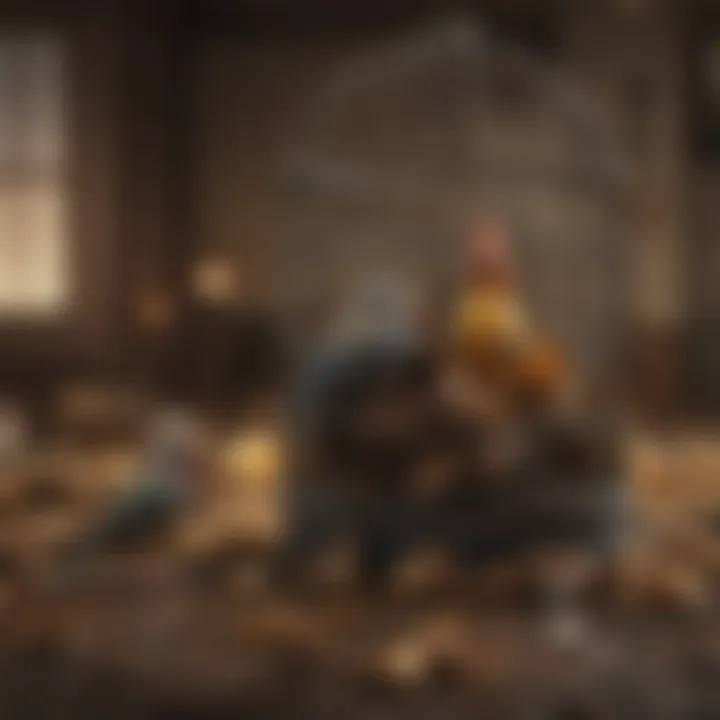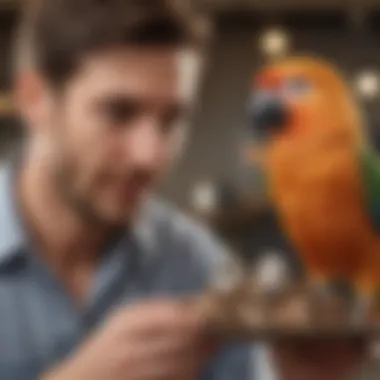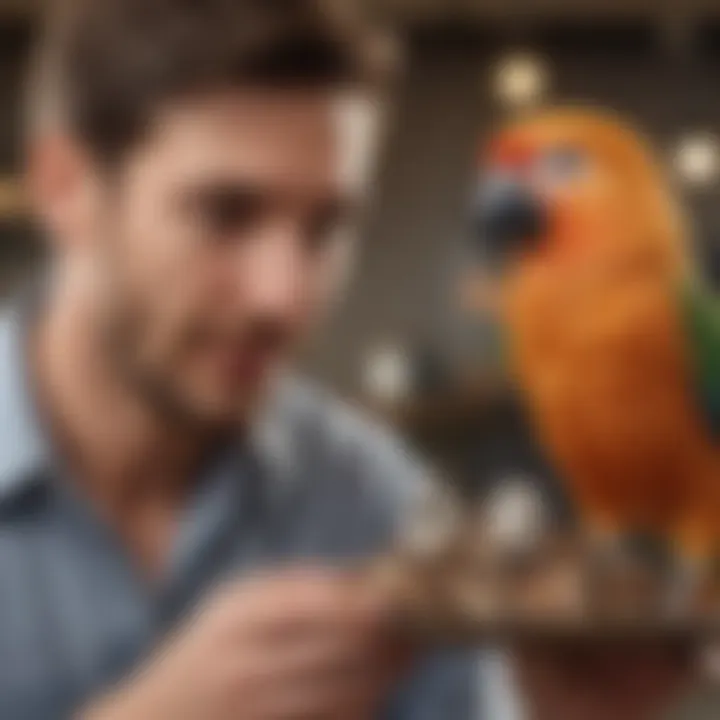Understanding Pet Bird Behavior: Do They Poop Everywhere?


Intro
Pet birds are fascinating companions. However, one often discussed topic is their bathroom habits. Bird owners frequently ponder whether their feathered pets will leave droppings in every corner of their homes. This inquiry leads to broader questions regarding avian behavior, hygiene practices, and how best to manage their unique needs. Understanding the specifics of this behavior is crucial, as it significantly impacts both cleanliness and the welfare of both the pet and the owner.
Regardless of the species or size of the bird, a little preparation can aid in minimizing mess. With the right strategies and understanding, owners can foster a harmonious living environment alongside their chirpy friends. This discussion goes beyond mere waste management; it encompasses daily routines, dietary considerations, health needs, and interactive activities to enrich the life of pet birds.
Care Tips
Daily Care Routines
Establishing a consistent daily routine is vital in monitoring and managing a pet bird's health and wellness. Each day should include specific tasks that contribute to both the bird’s physical environment and emotional health. These tasks commonly involve:
- Feeding: Provide fresh food and change water to prevent bacterial growth.
- Social Interaction: Engage in playtime or companionship activities. Pet birds are social and thrive on connection.
- Cage Inspection: Check the cage and its contents daily for items that could affect hygiene, ensuring all elements are robust and clean.
Cage Setup and Maintenance
Creating a proper habitat is essential for managing waste. The cage should be spacious enough to allow for movement without causing stress. Additionally, choosing the right liner helps manage droppings more effectively. Various options include:
- Paper or Fleece Liners: Versatile and easy to clean.
- Grate Bottoms: Enables droppings to fall below for easy disposal.
- Seed Guards: Prevent waste from flinging outside the cage.
Hygiene and Cleaning Practices
Maintaining hygiene is crucial in a pet bird’s environment. Mess from droppings can lead to odors and health issues. Weekly deep cleans and daily spot checks become necessary practices. Utilize a disinfectant safe for birds while cleaning surfaces. It's also beneficial to sanitize toys and remove leftover food promptly.
Seasonal Care Adjustments
Different seasons can affect a bird's behavior and responses significantly. Temperature fluctuations can contribute to changes in waste production. In colder months, birds tend to eat more during the day to maintain warmth. This affects their digestion, leading to variations in droppings. Adjust food portions and indoor temperatures accordingly.
Behavioral Insights
Understanding Bird Body Language
Comprehending how birds communicate through their body language offers valuable insights into their comfort, health, and needs. The small changes can reveal much about your bird's well-being, such as:
- Fluffed Feathers: This often signifies comfort but could indicate illness if prolonged.
- Head Bobbing: A sign of excitement or joy.
- Biting: Can denote stress or discomfort, commonly due to environmental factors.
Common Behavioral Issues and Solutions
Like all pets, birds can exhibit behavioral issues leading to unwanted behaviors, including problem pooping. Recognizing these behaviors is the first step toward addressing them. Solutions may include:
- Adjusting the environment or cage setup.
- Introducing more engaging toys.
- Providing ample exercise opportunities.
Positive Reinforcement Techniques
Positive methods can shape a bird’s habits and behaviors. A consistent training approach using treats as incentives encourages desirable behaviors. Treats can include small portions of fruits or specific seed mixes.
Social Interaction Needs
Social interaction significantly dees stress. Pet birds thrive with active engagement. Notably, interactivity reduces boredom, further limiting any potential nuisance behaviors, like random pooping. Expending time engaging can enhance empathy and mutual understanding.
Wellness and Health
Routine Health Checkups
Regular veterinary check-ups are crucial in ensuring your pet bird stays healthy. Preventive care can help nip signs of illness in the bud.
Identifying Symptoms of Illness
Awareness of changes in behavior, stool consistency, or unusual vocalizations plays a role in identifying potential health issues. Timely attention can facilitate swift intervention.
Preventative Care and Vaccinations


Consult a vet to understand necessary vaccinations and preventive care unique to your bird breed.
Mental and Emotional Well-being
Caring for the mental state of your pet bird transcends typical care routines. It entails ensuring they remain intellectually stimulated to avoid disturbances in normal behavior patterns. Engage in varied activities that promote mental enrichment.
Enriching Activities
Toys and Playtime Ideas
A bird’s environment must contain toys that mimic foraging instincts and promote exploratory behavior. Homemade puzzle treats can keep them mentally stimulated.
Training and Tricks
Using a reward system, owners can teach birds simple tricks such as ringing a bell or perching on a finger.
Outdoor Activities and Interaction
Supervised outdoor time allows birds to explore environments, gaining fresh air while expanding their experience range outside the cage. Interaction enables them to notice and affirm their surroundings safely.
DIY Projects for Mental Stimulation
Birds enjoy innovation in their toys and interaction zones. Collect bits of unused items from around your house that can be combined to create engaging activities.
Finally, birds are increasingly becoming popular household pets. Swift acknowledgment of their needs and habits fosters higher levels of satisfaction for both the owner and the bird itself. By promoting a deeper understanding of recognizing signs and behaviors held by these feathered companions, owners contribute positively to their lives. For ongoing conversations regarding responsible care, communities such as Reddit may be beneficial resources to tap into.
Prolusion to Avian Waste Management
Managing waste produced by pet birds is an integral part of their care. Many bird owners are often left wondering if their birds tend to poop everywhere. Addressing this concern requires an understanding of avian behavior and biology. This section serves to illuminate important concepts that owners must consider when managing waste and maintaining a clean living environment.
Understanding Bird Anatomy
Birds possess unique anatomical features that play a role in their waste production. They have a cloaca, a multifaceted opening that serves as an exit for waste, reproductive substances, and eggs. This setup simplifies the waste elimination process, which often leads to frequent pooping. Because birds excrete urine and feces simultaneously, the combination is often liquid and without distinct structure. This biological factor means that birds usually do not have control over when they go, making it essential for owners to monitor waste more closely, especially in indoor environments.
The Significance of Pooping Frequency
The frequency of defecation is significant in understanding bird health and behavior. Generally, small birds like budgerigars and canaries may poop several times an hour. Larger species, such as macaws, may have fewer occurrences but produce larger amounts. An average pet bird can defecate between 20 to 50 times a day, subjected to its size, species, and diet. It’s crucial for bird owners to observe their pet’s patterns, as changes in frequency can indicate health issues. Owners must integrate insights from their observations to adjust the birds' environments effectively.
Common Misconceptions About Pet Birds
Understanding pet birds extends beyond their colorful feathers and brilliant songs. One aspect that often creates anxiety for potential bird owners is the common misconceptions surrounding their behavior, especially in terms of their waste management. Recognizing and addressing these misconceptions plays a crucial role in nurturing a harmonious relationship between bird and owner.
Ruling Out Stigmas
There exists a certain stigma associated with pet birds that paints them as messy and uncontrollable creatures. Social narratives and anecdotes from ill-informed sources have contributed to this image. However, it is essential to differentiate reality from perception. While it is true that birds will poop, their defecation is somewhat predictable when understood from their biological perspective.
Unlike mammals, birds have a unique digestive process. They break down food rapidly, with most food matter moving through the system within a matter of hours. This means that birds will indeed need to relieve themselves frequently. However, this behavior is not indicative of a lack of cleanliness. Many medium- and large-sized species instinctively target certain areas within their habitat. Likewise, small birds can be trained to stay in designated zones. Thus, dismissing all birds as indiscriminately dirty is a misunderstanding steeped in folklore rather than fact. It is the owner's responsibility to learn about specific species and their tendencies regarding waste.
Behavioral Expectations
One can argue another misconception relates to the standards we uphold for bird behavior stemming from our experiences with animals like cats and dogs. Expecting birds to behave in similar ways often leads to frustration and disappointment. Birds require different considerations regarding training and environmental structure. For example, parrots are social creatures that tend to express their feelings boldly through various behaviors, including vocalizations and movement. This may mislead some into thinking their essence is tumbling into chaos as waste seems to appear where they please.
It is possible that pet birds perceive different parts of their space entirely. Desktop surfaces, couches, and open areas may all become fair game for them—and ultimately the feces they produce. However, understanding a bird's natural tendencies can help mitigate issues associated with waste.
In summary:
- Species awareness is important to reduce misconceptions about hygiene. Gain insights from communities like Reddit and expert discussions in avian care.
- Training should revolve around proper waste management during fledgling behaviors; patience can help inhibit distractions in unfamiliar territory.
- Creating a suitable environment with designated perching and landing pads tailored to the bird’s specific needs will encourage healthier habits while freeing owners from constantly scrutinizing their surroundings.
Clear misconceptions and raise your avian knowledge; understanding behavior and hygiene is enlightening.
Sharpen your expectations, integrate training, and involve yourself in your bird's growth. That way, both birds and their owners can relish a more peaceful coexistence.
Factors Influencing Where Birds Defecate


Understanding why and where birds tend to defecate is key for maintaining a clean space for both pet birds and their owners. Many factors influence this behavior. Knowing about these factors can aid bird owners in implementing effective management strategies. Reducing mess involves understanding the various influences and adapting care practices accordingly. This section addresses significant considerations that inform avian waste behavior surrounding domestic environments.
Species-Specific Behaviors
Different species exhibit unique defecation habits based on their biology and evolutionary traits. For instance, larger birds, like macaws, might have different routines compared to smaller species, such as budgerigars.
- Larger species tend to produce more waste due to their size and metabolic rates.
- Each species has distinct preferences for preferred perching areas. This influences the placement of waste in living environments.
The social behaviors of pet birds also impact where and when they decide to defecate. Parrots display social bonding through play and interaction, which may lead them to poop in places they feel most secure with their humans. It is helpful for owners to research their specific bird species for more precise insights.
Environmental Stimuli
The setting where a bird lives plays a significant role in its waste habits. Birds are sensitive to their environments. These sensitivities encompass sounds, movements, and the overall layout.
- Triggers: Sudden noises or movements may cause a bird to defecate more often due to fright or stress.
- Location Description: Areas where birds feel safe and have visibility tend to become favored places for waste deposition.
Owners should ensure that their birds live in an environment that offers adequate stimulation without being overwhelming. Proper environmental setup can assist in directing birds to designated areas for waste, reducing indiscriminate pooping.
Dietary Impact on Waste Production
Diet is one of the most impactful contributors to bird waste production. A well-balanced diet made up of varied foods affects both the frequency and the volume of waste.
- High Water Content: Fresh fruits and vegetables are commonly rich in water. This intake may intensify waste production, leading to more frequent defecation.
- Diet Composition: Low-quality diets may cause issues, resulting in more problematic feces. Owners should consult speciality diets available on market for optimal health and waste control.
Being mindful of feeding practices can help pet owners create better management strategies aligned with their specific birds’ needs. By observing reactions to diet changes, birds can less likely promote an unsightly mess around the home.
Proper understanding of birds' defecation tends to forge a better environment for both our furry companions and ourselves. Such measures require more of our attentiveness as pet caregivers and bonders.
Implementing factor-specific strategies offers insights free of misconceptions commonly attached to pet bird ownership. This holistic grasp on stimulating behaviors, environmental needs, and dietary impact scales meaningful change towards a cleaner pet ownership experience.
Training Techniques for Waste Management
Training your pet bird for waste management is essential. This aspect plays a crucial role in ensuring both your comfort and that of your feathered companion. Proper waste management minimizes unhygienic conditions in the living area. It reflects on the bond you share with your bird as well, showcasing your dedication to their wellbeing and reducing instances of unfortunate incidents around the house.
Establishing a Routine
Creating a consistent routine helps your avian friend understand expected behaviors. Birds tend to respond well to patterns. You can start by observing the times when your bird typically defecates. Identifying these intervals creates a solid base for training. If your bird often defecates early in the morning or after eating, align training sessions to coincide with those moments.
- Scheduled Potty Times: Program specific times for your bird to socialize and monitor their waste elimination. Engage with your pet closely during these periods.
- Perches or Areas: Designate specific perches or spots for your bird, reinforcing the understanding that these areas are acceptable for defecation.
- Consistent Interaction: Be patient and maintain consistency during these sessions. Your bird will gradually learn the routine.
By following a defined pattern, you enable your bird to have predictable opportunities for waste elimination, minimizing accidents elsewhere.
Positive Reinforcement Methods
Utilizing positive reinforcement can make a marked difference in waste management training. Praising and rewarding your bird for desired behaviors fosters a positive learning environment. The result is a more willing learner and more effective training.
- Tasty Treats: Offer small, healthy treats like seeds, fruits, or vegetables when your bird vacates in the honored zones. The connection between the action and reward encourages repetition of that behavior.
- Verbal Praise: Alongside treats, verbal affirmations reinforce good behavior. A simple “good bird
Insights from Bird Owners
Understanding the experiences of bird owners is crucial when addressing the behavior of pet birds, especially regarding their waste management habits. Drawing insights from real-life situations allows us to comprehend various perspectives and solutions that may not be covered by formal research. Bird owners frequently face unique challenges and can offer practical advice based on their daily interactions with their avian companions. Therefore, their anecdotes provide a touch of reality and authenticity that are valuable for this topic.
Experiences Shared on Reddit
One of the most compelling platforms for sharing personal experiences is Reddit. This site contains communities focused exclusively on pet birds where individuals exchange thoughts, frustrations, and victories. Discussions often revolve around the unpredictable nature of bird waste. For instance, a user might recount how their parakeet, despite housing in spacious enclosures, prefers to perch on furniture for relaxation. This brings into focus the shifting expectations an owner may encounter. Users also note innovative techniques they try to encourage birds to stay within particular spots while minimizing mess.
From training tactics to suggested materials and setups, the diversity of opinions helps aspiring bird parents prepare for common issues. Observational insights often prove more convincing than theoretical approaches since they come from lived experiences of fellow bird enthusiasts. Whether it's specific placements of perches or the timing of out-of-cage time, sharing these snippets enhances overall understanding for others in similar circumstances.
Real-world Solutions and Tips
After considering these experiences, it becomes clear that turning anecdotal evidence into actionable tips can greatly aid bird owners. Below are several solutions that many users recommend based on shared experiences:
- Whitespace Handling: Keeping the bird’s habitat clean can significantly improve surroundings. Owners often outline daily or bi-daily routines that include minimal yet effective cleanup procedures.
- Perch Training: Engaging birds in perch training involves rewarding them for utilizing designated areas for waste. This helps minimize accidents elsewhere.
- Create Catch Systems: Many suggest utilizing catch trays or disposable mats under perches. This can save time and lessen cleanup residue.
- Dietary Adjustments: Changing a bird's diet can influence waste management too. Users reported observing differences in frequency and nature of waste after meals rich in fiber versus seed rosters.


Remember, each bird is different in their behavior concerning waste. The overall goal is a harmonious living environment, balancing the pet's needs and owner’s lifestyle.
It is this collective pool of practical wisdom that shapes positive experiences among pet bird owners. Members of the avian community continually emphasize the tailored training regimens, personalized housing solutions, and understanding impulsive behaviors, allowing for productive cohabitation within the shared space.
Maintaining a Clean Environment
Maintaining a stable and clean environment is crucial for the health and happiness of pet birds. A clean space helps promote good hygiene and decreases the likelihood of diseases, both for birds and humans. This bears significant relevance considering that pet birds can be prone to bacterial infections, with their settings often being breeding grounds for germs if waste is not managed properly. Keeping living areas clean also improves the overall aesthetic and makes interactions much more enjoyable.
Considering cleaning also contributes to reducing stress in your pet bird. Birds can be sensitive to strong odors, which can arise from accumulated waste. They tend to feel secure when they inhabit a clean space. If waste is left unattended, it can potentially cause behavioral issues in birds, leading to anxiety and reduced well-being.
In summary, keeping environments clean is not just about cleanliness; its about creating an atmosphere that is conducive for the health and happiness of your beloved bird.
Daily Cleaning Routines
Daily cleaning habits form the backbone of effective waste management for pet birds. It generally involves simple tasks that, over time, form a more comprehensive care routine. Doing these daily cleaning tasks can help manage waste—allowing for better air quality and reducing possible health risks associated with an unclean environment.
Here are beneficial elements of a daily routine:
- Remove waste immediately: Scoop out any poop regularly to prevent odors and the growth of bacteria. It's a good practice to take these shortcuts.
- Clean feeding and watering areas: Ensure that bowls are clean before every feeding. Leftover food can create fine pen for unwanted pests or molds.
- Wipe surfaces thoroughly every day: Maintain a habit of sanitizing cages, perches, and other surfaces to remove any residue.
- Check cage lining and bedding: Replace any soiled bedding or cage lining daily. Use appropriate materials to minimize beak access to dirt.
By adhering to these practices daily, bird owners can significantly lessen their worries about cleanliness and focus more on enjoying the company of their animal companions.
Choosing Appropriate Materials
Selecting appropriate materials for daily cleaning is equally important as maintaining a routine. The materials can impact cleaning efficiency and bird health. It's crucial to approach this selection strategically. Here are some points to starg with:
- Safe cleaning products: Opting for non-toxic, bird-safe disinfectants is imperative. Many standard household cleaners contain chemicals that can adversely affect birds.
- Cage liners: Materials like paper towels or safe wood shavings can be superb options for cage lining. They retain moisture well while ensuring effective waste management.
- Sanitizing tools: Using brushes with space to not short items into pipes if trapped. For surfaces, microfiber cloths tend to capture more dirt and microbes effectively than basic rags.
- Natural remedies: Products such as vinegar and baking soda are well-known natural cleaning agents. They can neutralize odors without introducing harmful chemicals.
By choosing proper materials for both cleaning and maintenance, owners can ensure the safety of their pet birds while promoting a hygienic living space. This not only aids in their health but also improves the overall companionship experience.
The Role of Avian Hygiene in Overall Health
Avian hygiene plays a crucial role in the health and well-being of pet birds. Understanding the connection between hygiene and overall health can help bird owners maintain a safe and clean environment for their companions. Poor hygiene can lead to numerous health problems, emphasizing the necessity for regular cleaning and good waste management practices.
Understanding the Connection
Birds are naturally clean animals, but their living conditions can affect their health drastically. In relation to waste, birds excrete waste very frequently, which means unsanitary conditions can quickly develop. When fecal matter accumulates, it can promote the growth of harmful bacteria and parasites that may lead to diseases.
Research indicates that poor air quality, stemming from accumulated droppings, increases the risk of respiratory problems for birds. Furthermore, some species are particularly sensitive to environmental changes, underscoring how important it is to keep an orderly habitat. Daily cleaning routines help maintain a space that reduces stress for the birds, ultimately leading to healthier and more active pets.
Preventing Health Issues
Preventing health issues is a major benefit of proper hygiene practices in avian care. By maintaining a clean environment, bird owners can significantly lower the risk of infections, diseases, and parasites. Some critical steps include:
- Regular Cage Cleaning: Remove old food, droppings, and debris daily. A deep clean should be conducted weekly, ensuring all surfaces are sanitized.
- Monitor Health Signs: Keep an eye on any changes in behavior, such as reduced activity or changes in eating habits. Illness can sometimes tie back to poor hygienic practices.
- Cull Potential Hazards: Items in a bird's space should be scrutinized for their potential to harbor bacteria. Toys, perches, and feeders should be easily cleanable.
“An ounce of prevention is worth a pound of cure.” Keeping birds healthy through hygiene should be a priority for any owner.
Through these preventive measures, experts suggest significant reductions in unfortunately frequent avian health challenges. Bird owners become proactive by resembling basic guidelines modeled after aviary specialists and veterinarians. Including avian hygiene as a focal point of bird ownership not only enhances the quality of life for birds but elevates the knowledge and responsibility of their caretakers.
End and Final Thoughts
In the journey of understanding pet bird behavior, particularly regarding their toileting habits, it is critical to appreciate the intricate relationship between numerous factors. Each bird species has distinguishable traits that dictate their waste management patterns. Environmental influences can't be overlooked; they can greatly alter a bird's sense of security and definitively affect where and how they defecate. Moreover, training methods play a significant role in guiding behavior. Birds are creatures of habit, and training provides them structure, turning what may initially seem like random acts of defecation into predictable routines.
Recognizing these essential components promotes better practices among bird owners. Creating a clean and safe environment for both birds and owners significantly enhances the quality of life for our feathered companions. It contributes to their overall health and wellbeing while reducing owner's overwhelm from managing waste. This bridging of understanding between owners and bird needs cultivates a caring atmosphere fostering healthy and happy interactions.
Successful waste management ensures birds can thrive in their environment without behavioral issues stemming from improper settings or training neglect.
Summary of Key Points
- Understanding specific bird species exposes behavioral norms related to waste management.
- Environmental stimuli, like temperature and stress levels, are pivotal in influencing behavior.
- Regular training reinforces good habits, making waste management manageable for both owner and bird.
- A tidy environment prescribes essential considerations for both health and personal satisfaction.
Future Considerations for Bird Owners
Moving forward, bird owners should actively seek continued education on these topics. This involves knowing all aspects that affect your bird’s comfort and behavior. Looking into behaviors recommend potential adjustments, if necessary. Engaging in forums, like those found on Reddit, dedicated to avian companionship can expand knowledge and connect with fellow owners facing similarly challenging experiences.
Being kept informed about advancements in bird care and behavior reinforces responsible ownership. Future training methods, adapted housing solutions, and insights into dietary products may emerge, impacting pet bird health and hygiene positively. Consistently evaluating the birds’ needs can mitigate complications related to mishandling waste and help in fostering long-lasting relationships.
By being proactive and understanding the bird’s perspectives on its living arrangements, owners will create a harmonious cohabitation that enhances both owner pleasure and bird satisfaction.















